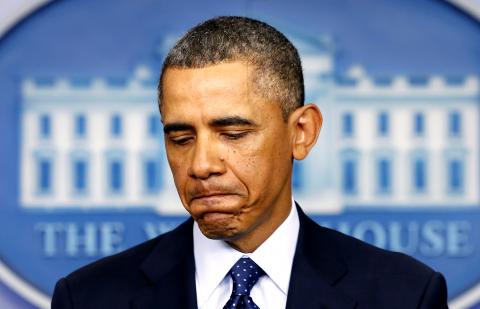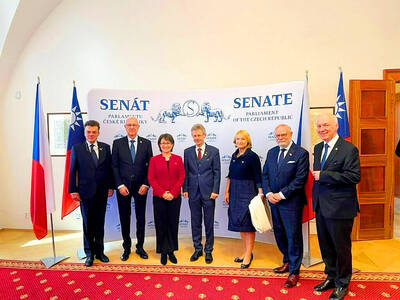Just hours after across-the-board spending cuts officially took effect, US President Barack Obama pressed the US Congress yesterday to work with him on a compromise to halt a fiscal crisis he said was starting to “inflict pain” on communities across the US.
Obama and a bipartisan group of congressional leaders failed on Friday to avoid the deep spending reductions known as the “sequester,” which automatically kicked in overnight in the latest sign of dysfunction in a divided Washington.
If left in place without legislative remedy, government agencies will have to hack a total of US$85 billion from their budgets between yesterday and Oct. 1, cuts that over time could cause economic harm, slash jobs and curb military readiness.

Photo: Reuters
“These cuts are not smart,” Obama said in his weekly radio and Internet address. “They will hurt our economy and cost us jobs. And Congress can turn them off at any time — as soon as both sides are willing to compromise.”
Obama signed an order on Friday night that started putting the cuts into effect.
At the heart of Washington’s persistent fiscal showdowns is disagreement over how to slash the budget deficit and the US$16 trillion national debt, bloated over the years by wars in Iraq and Afghanistan and government stimulus for the ailing economy.
The Democratic president wants to close the fiscal gap with spending cuts and tax hikes — what he calls a “balanced approach.”
However, Republicans do not want to concede again on taxes after doing so in negotiations over the “fiscal cliff” at the New Year.
“The discussion about revenue, in my view, is over. It’s about taking on the spending problem,” Republican US House of Representatives Speaker John Boehner said on leaving the talks between Obama and congressional leaders on Friday.
As Obama and his aides have done for weeks, the president in his radio address offered a litany of hardships he said would flow from the sequester, saying: “Severe budget cuts ... have already started to inflict pain on communities across the country.”
“Beginning this week, businesses that work with the military will have to lay folks off. Communities near military bases will take a serious blow. Hundreds of thousands of Americans who serve their country — Border Patrol agents, FBI agents, civilians who work for the Defense Department — will see their wages cut and their hours reduced,” he said.
“The longer these cuts remain in place, the greater the damage,” he said. “Economists estimate they could eventually cost us more than 750,000 jobs and slow our economy by over one-half of one percent.”

FREEDOM OF NAVIGATION: The UK would continue to reinforce ties with Taiwan ‘in a wide range of areas’ as a part of a ‘strong unofficial relationship,’ a paper said The UK plans to conduct more freedom of navigation operations in the Taiwan Strait and the South China Sea, British Secretary of State for Foreign, Commonwealth and Development Affairs David Lammy told the British House of Commons on Tuesday. British Member of Parliament Desmond Swayne said that the Royal Navy’s HMS Spey had passed through the Taiwan Strait “in pursuit of vital international freedom of navigation in the South China Sea.” Swayne asked Lammy whether he agreed that it was “proper and lawful” to do so, and if the UK would continue to carry out similar operations. Lammy replied “yes” to both questions. The

Two US House of Representatives committees yesterday condemned China’s attempt to orchestrate a crash involving Vice President Hsiao Bi-khim’s (蕭美琴) car when she visited the Czech Republic last year as vice president-elect. Czech local media in March last year reported that a Chinese diplomat had run a red light while following Hsiao’s car from the airport, and Czech intelligence last week told local media that Chinese diplomats and agents had also planned to stage a demonstrative car collision. Hsiao on Saturday shared a Reuters news report on the incident through her account on social media platform X and wrote: “I

SHIFT PRIORITIES: The US should first help Taiwan respond to actions China is already taking, instead of focusing too heavily on deterring a large-scale invasion, an expert said US Air Force leaders on Thursday voiced concerns about the Chinese People’s Liberation Army’s (PLA) missile capabilities and its development of a “kill web,” and said that the US Department of Defense’s budget request for next year prioritizes bolstering defenses in the Indo-Pacific region due to the increasing threat posed by China. US experts said that a full-scale Chinese invasion of Taiwan is risky and unlikely, with Beijing more likely to pursue coercive tactics such as political warfare or blockades to achieve its goals. Senior air force and US Space Force leaders, including US Secretary of the Air Force Troy Meink and

Czech officials have confirmed that Chinese agents surveilled Vice President Hsiao Bi-khim (蕭美琴) during her visit to Prague in March 2024 and planned a collision with her car as part of an “unprecedented” provocation by Beijing in Europe. Czech Military Intelligence learned that their Chinese counterparts attempted to create conditions to carry out a demonstrative incident involving Hsiao, which “did not go beyond the preparation stage,” agency director Petr Bartovsky told Czech Radio in a report yesterday. In addition, a Chinese diplomat ran a red light to maintain surveillance of the Taiwanese